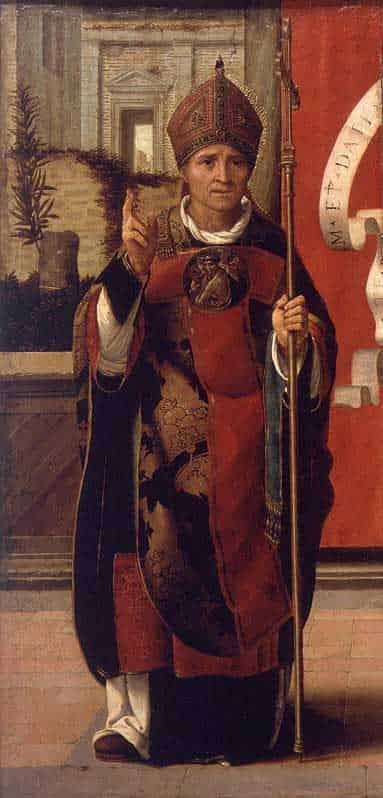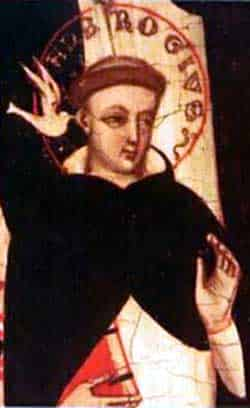Saint Antoninus Catholic Saint
Catholic Saints 28-12-2023, 19:37

Saint Antoninus
Catholic Saint
st.Antoninus-Archbishop of Florence
Feast Day : May 10
Patronage: fever sufferers
Also known as: Antonius, Antonino
Antoninus was born in Florence on March 1, 1389, the only child of Niccolo Pierozzi, a lawyer, and his wife Thomassina. He was baptized Antonius or Antonio, but because of his small size and gentle nature he was called by the diminutive “Antoninus” or “Antonino” all his life. Supposedly a pious child, at age 15 Antoninus applied to Blessed John Dominic for admission to the Dominican Order. In 1404 Bl. John was at the Convent of Santa Maria Novella in Florence, but he was reforming the Dominican priories in the area and organizing a new house at Fiesole. Afraid that the frail Antoninus could not tolerate the vigorous austerities of the new monastery, Bl. John did not turn the boy down directly but told him to go home and memorize the Decretum Gratiani, or Decrees of Gratian, an enormous compilation of Church law. Determined, Antoninus returned in a year, the book entirely committed to memory, and was accepted. Along with Fra Angelico and Fra Benedetto (natural brothers: one the famous painter, the other a miniaturist), Antoninus spent his novitiate in Cortona, then returned to Fiesole, where he stayed until 1409. A zealous reformer like Bl. John, Antoninus was named vicar of the convent at Foligno in 1414, then subprior and prior of the convent at Cortona.
From 1418 to 1428 he served as prior of convents in Naples, Gaeta, Siena and Fiesole, and then was named prior of the convent at Minerva in Rome in 1430. From 1433 to 1446 he was superior of the reformed Tuscan and Neapolitan congregations, in which post he restored the primitive rules of the Dominican order. In 1439 Pope Eugenius IV summoned Antoninus to attend all sessions of the General Council of Florence. Antoninus’s greatest achievement was the foundation of the convent of St. Mark, or San Marco, in Florence, in buildings formerly owned by the Silvestrines. The monastery and adjoining church generously supported by Cosimo de’ Medici became a center for Christian art and scholarship, housing a large library and gracefully redesigned by Michelozzo. The chapel frescoes were painted by Antoninus’s old friend Fra Angelico, and his brother Benedetto decorated the choir books. Scenes from Antoninus’s life adorn the cloisters. Reportedly to Antoninus’s dismay, his great talents for preaching, Church reform, scholarship and diplomacy led Pope Eugene IV (r. 1431–47) to name him archbishop of Florence in 1446. He tried to hide on the island of Sardinia to escape the post, but was consecrated at the pope’s command on March 13, 1446. Less than a year later, Eugene asked Antoninus to administer the final sacraments to him before he died on February 23, 1447, in the archbishop’s arms. Antoninus pursued his new duties with enthusiasm, visiting all the parishes of his diocese on foot each year, reforming clerical abuses, putting a stop to gambling, opposing usury and magic, and preaching, praying and writing. He was especially active in helping the poor, often emptying the church’s pantries and storerooms and even selling furniture when there was nothing else to give. He nursed and comforted victims of the plague of 1448 and attempted to rebuild shelters for those made homeless in the earthquakes of 1453–55. Pope Nicholas V (r.1447–55) frequently consulted him on both civil and ecclesiastical issues, valuing the archbishop’s opinion so highly that he forbade any appeal to Rome of Antoninus’s decisions. Nicholas V even went so far as to declare that Antoninus, in his lifetime, deserved sainthood as much as the dead Bernardine of Siena, whom the pope was about to canonize.
Antoninus often served as a papal ambassador, and Pope Pius II named him to a commission charged with reforming the Roman curia. A distinguished theologian, Antoninus was one of the first Christian writers to acknowledge the changes in economics and society brought on by the Renaissance, teaching that money invested in commerce and industry was true capital, and that receiving interest on such investment was not usury and therefore morally lawful. Antoninus died on May 2, 1459, at San Marco, and Pope Pius II (r. 1458–64) himself presided over the funeral. Cosimo de’ Medici, not particularly fond of the Dominicans, frankly admitted that Florence would not have survived the dangers, natural catastrophes and seditious plots against it without the intercession of the archbishop. Antoninus’s incorrupt body was moved to a new chapel at San Marco in 1559.

Inspirational Bible Quotes HD Wallpapers: Luke 3:6 Free Download Bible Quotes HD-Wallpaper Luke 3:6 Download...
Learn more
Saint Ambrose Sansedoni Catholic Saint st.Ambrose Sansedoni, Blessed-Dominican, diplomat Feast Day : March...
Learn more
The Death of Jezebel 2 Kings 9:14-37 Bible Stories 2 Kings 9:14 Then Jehu, the son of Jehoshaphat, the son...
Learn more